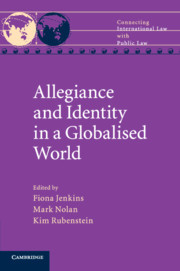Description
Allegiance and Identity in a Globalised World
Connecting International Law with Public Law Series
Coordinators: Jenkins Fiona, Nolan Mark, Rubenstein Kim
Examines questions of allegiance and identity in a globalised world through the disciplines of law, politics, philosophy and psychology.
Language: English
Subject for Allegiance and Identity in a Globalised World:
Publication date: 12-2018
Support: Print on demand
Support: Print on demand
Description
/li>Contents
/li>Biography
/li>
Interrogating the concepts of allegiance and identity in a globalised world involves renewing our understanding of membership and participation within and beyond the nation-state. Allegiance can be used to define a singular national identity and common connection to a nation-state. In a global context, however, we need more dynamic conceptions to understand the importance of maintaining diversity and building allegiance with others outside borders. Understanding how allegiance and identity are being reconfigured today provides valuable insights into important contemporary debates around citizenship. This book reveals how public and international law understand allegiance and identity. Each involves viewing the nation-state as fundamental to concepts of allegiance and identity, but they also see the world slightly differently. With contributions from philosophers, political scientists and social psychologists, the result is a thorough appraisal of allegiance and identity in a range of socio-legal contexts.
1. Introduction: allegiance and identity in a globalised world Fiona Jenkins, Mark Nolan and Kim Rubenstein; Part I. Constitutional Legal Foundations: 2. Identity at the edge of the constitutional community Elisa Arcioni; 3. An odd partnership: identity-based constitutional claims in modern democracy Vito Breda; 4. Reconciling regional autonomy with national sovereignty: what does China mean to Hong Kong? Simon Marsden; 5. Is Europe still worth fighting for? Allegiance, identity, and integration paradigms revisited Pablo Cristóbal Jiménez Lobeira; Part II. Indigenous and Customary Law: 6. (Em)placing law: migration, belonging and place in Solomon Islands Rebecca Monson and George Hoa'au; 7. Does law constitute identity? Indigenous allegiance and identity in Australia Asmi Wood and Jo-Anne Weinman; Part III. Social Inclusion and Exclusion: 8. Pledging allegiance: the strangers inside democracy and citizenship Fiona Jenkins; 9. When immigrants and converts are not truly one of us: examining the social psychology of marginalizing racism Michael J. Platow, Diana M. Grace and Michael J. Smithson; 10. Diversity, national identity and social cohesion: welfare redistribution and national defence Peter Balint; Part IV. National Security Concerns and Counter-terrorism Law: 11. The security of citizenship?: Finnis in the context of the United Kingdom's citizenship stripping provisions Rayner Thwaites; 12. Political criminals, terrorists and extra-criminal regimes of punishment Ben Golder and Christopher Michaelsen; 13. Dangerous intersection: migration and counter-terrorism laws in the case of Dr Mohammed Haneef Susan Harris Rimmer; Part V. Forced and Voluntary Migration of Refugees and Children: 14. Recognition and narrative identities: is refugee law redeemable? Matthew Zagor; 15. Myth-conceiving sovereignty: the legacy of the nineteenth century Eve Lester; 16. Betrayal and broken ties: British child migrants to Australia, citizenship and identity Sharon Bessell; Part VI. Temporary or Permanent Labour Migration: 17. Temporary migration, identity and allegiance Valeria Ottonelli and Tiziana Torresi; 18. Transnational labour migrants: whose responsibility? Susan Kneebone; Part VII. Transnational and International Legal Perspectives: 19. The complicated case of Stern Hu: allegiance, identity and nationality in a globalised world Joshua Neoh, Donald R. Rothwell and Kim Rubenstein; 20. The end of Olympic nationality Peter J. Spiro; 21. The perils of judicial construction of identity - a critical analysis of the International Criminal Tribunal for the Former Yugoslavia's Jurisprudence on Protected Persons Tamás Hoffman; 22. Primordialism and otherness: the 'ethnic' underpinning of 'minority' in international law Mohammad Shahabuddin; 23. The relevance of nationality in the age of Google, Skype and Facebook Rishi Gulati; 24. Concluding remarks Thomas Pogge.
Fiona Jenkins is a senior lecturer in the School of Philosophy, the Research School of Social Sciences, Australian National University, Canberra.
Mark Nolan is an associate professor at the Australian National University College of Law, Canberra.
Kim Rubenstein is professor and Director of the Centre for International and Public Law, Australian National University College of Law, Canberra.
Mark Nolan is an associate professor at the Australian National University College of Law, Canberra.
Kim Rubenstein is professor and Director of the Centre for International and Public Law, Australian National University College of Law, Canberra.
© 2024 LAVOISIER S.A.S.

